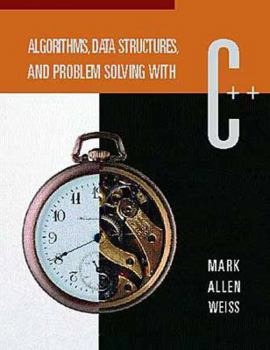Algorithms, Data Structures, and Problem Solving with C++
Select Format
Select Condition 
Book Overview
This text provides explanations both of problem solving and algorithms using C++. The book's theoretical perspective emphasizes software engineering and object-oriented programming and is designed to... This description may be from another edition of this product.
Format:Hardcover
Language:English
ISBN:0805316663
ISBN13:9780805316667
Release Date:January 1996
Publisher:Addison Wesley Publishing Company
Length:820 Pages
Weight:3.10 lbs.
Dimensions:1.2" x 7.6" x 9.5"
Customer Reviews
2 ratings
This is one book every C++ Programmer should purchase.
Published by Thriftbooks.com User , 26 years ago
This book should be on every C++ programmers list. Of all the books I've read on Data Structures and Algorithms using the C++ language this is the most comprehensive. This book also built my knowledge on the C++ language. I look forward to reading more books by this author.
Good, but needs improvement
Published by Thriftbooks.com User , 26 years ago
I just finished a semester at the University of Texas at Austin in which this book was the text book for an abstract data types class. The book is a good textbook, but not a good desk reference. The book is obviously written with students in mind, using rhetorical questions, leaving vital areas unexplained as "exercises for the reader", etc. As an introductory text, in an introductory class, the book served its purpose, though the professor was required to explain some of the details that the book lacked. The code that is included in the book is all written in pseudo-code, most of it does not compile without some tweaking, and when a student is trying to grasp a diffucult concept in graph theory, the last thing that student wants is to have to trace through the program, line-by-line, to catch some error that is irrelevant to the larger problem, such as semicolons that have been left out, unmatched parenthesis, variable names that are not allowed by most of the commercial compilers. The book does have a good learning curve, however, and makes for good reading when first approaching a new computer science concept; however, when having to program a particularly hard section of a certain data structure, wading through pages of diatribe against older methods is not what is needed at that time. For instance, after spending a large portion of an entire chapter on AVL trees, Weiss proceeds to give example code (that doesn't compile on Borland 5.0, Visual C++, or GNU compilers without some tweaking), but leaves out a crucial method! When first learning about AVL trees, one of the lessons that was drilled into our heads was the diffuculty of AVL deletion... yet the book summed it up in *one* sentence: "As with most data structures, deletion is the hardest task; it is left as an exercise to the reader." Argh.






